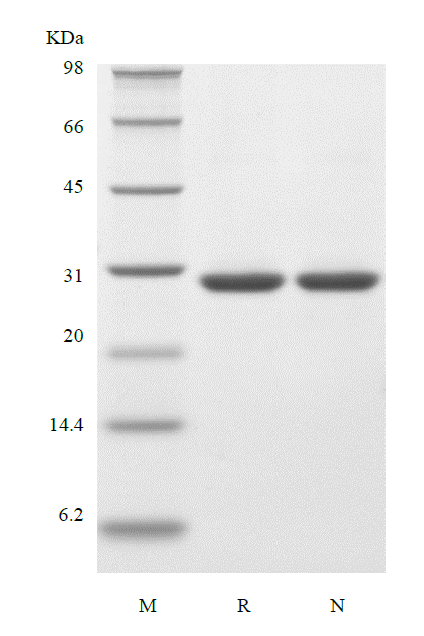- Source
- Escherichia coli.
- Molecular Weight
- Approximately 22.9 kDa with 6×His-tag on C-terminus, a single non-glycosylated polypeptide chain containing 210 amino acids. But it migrates with an apparent molecular mass of 29 kDa in SDS-PAGE.
- AA Sequence
- MGTYKLILNG KTLKGETTTE AVDAATAEKV FKQYANDNGV DGEWTYDDAT KTFTVTEKPE VIDASELTPA VTTYKLVING KTLKGETTTE AVDAATAEKV FKQYANDNGV DGEWTYDDAT KTFTVTEKPE VIDASELTPA VTTYKLVING KTLKGETTTK AVDAETAEKA FKQYANDNGV DGVWTYDDAT KTFTVTEKLA AALEHHHHHH
- Protein per Gram Powder
- See Label.
- Concentration for 1 unity OD at 280 nm
- 0.767 mg/ml
- Physical Appearance
- Sterile Filtered White lyophilized (freeze-dried) powder.
- Purity
- > 97 % by SDS-PAGE and RP-HPLC analyses.
- Specificity
- The recombinant Protein G is a genetically engineered protein containing 3 IgG-binding regions of protein G. Cell wall binding region, cell membrane binding region and albumin binding region have been removed from the recombinant Protein G to ensure the maximum specific IgG binding. The recombinant Protein G is ideal for purification of polyclonal or monoclonal IgG antibodies. Protein G binds to various human, mouse and rat IgG subclasses (e.g., human IgG1, IgG2, IgG3, IgG4; mouse IgG2a, IgG2b, IgG3; rat IgG2a, IgG2c). It also binds to total IgG from cow, goat, sheep, house and rabbit.
- Endotoxin Level
- Less than 0.1 EU/μg of Protein G, His as determined by LAL method.
- Formulation
- Lyophilized from additive free solution.
- Stability & Storage
- Use a manual defrost freezer and avoid repeated freeze-thaw cycles.
- 12 months from date of receipt, -20 to -70 °C as supplied.
- 1 month, 2 to 8 °C under sterile conditions after reconstitution.
- 3 months, -20 to -70 °C under sterile conditions after reconstitution.
- Reconstitution
- Dissolve in distilled water or saline.
- Shipping
- The product is shipped at ambient temperature. Upon receipt, store it immediately at -20 °C.
- SDS-PAGE

- Background
- Protein G is a bacterial protein derived from the cell wall of certain strains of b-hemolytic Streptococcci. It binds with high affinity to the Fc portion of various classes and subclasses of immunoglobulins from a variety of species. Protein G binds to all IgG subclasses from human, mouse and rat species. It also binds to total IgG from guinea pig, rabbit, goat, cow, sheep, and horse. Protein G binds preferentially to the Fc portion of IgG, but can also bind to the Fab region, making it useful for purification of F(ab') fragments of IgG. Due to it's affinity for the Fc region of many mammalian immunoglobulins, protein G is considered a universal reagent in biochemistry and immunology.









 COA Application
COA Application


